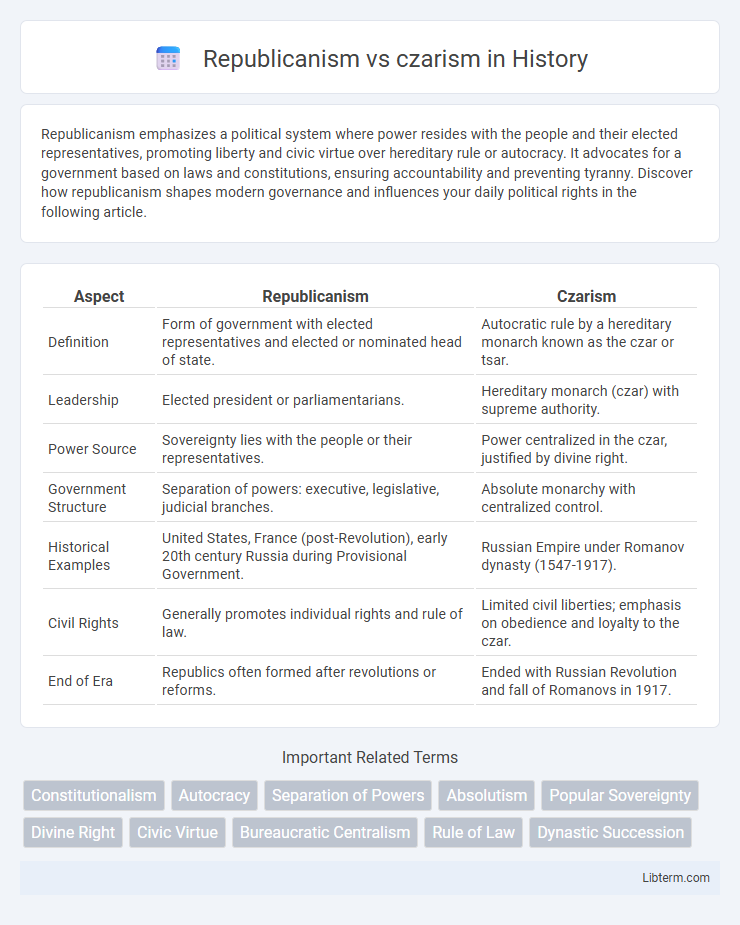Republicanism emphasizes a political system where power resides with the people and their elected representatives, promoting liberty and civic virtue over hereditary rule or autocracy. It advocates for a government based on laws and constitutions, ensuring accountability and preventing tyranny. Discover how republicanism shapes modern governance and influences your daily political rights in the following article.
Table of Comparison
| Aspect | Republicanism | Czarism |
|---|---|---|
| Definition | Form of government with elected representatives and elected or nominated head of state. | Autocratic rule by a hereditary monarch known as the czar or tsar. |
| Leadership | Elected president or parliamentarians. | Hereditary monarch (czar) with supreme authority. |
| Power Source | Sovereignty lies with the people or their representatives. | Power centralized in the czar, justified by divine right. |
| Government Structure | Separation of powers: executive, legislative, judicial branches. | Absolute monarchy with centralized control. |
| Historical Examples | United States, France (post-Revolution), early 20th century Russia during Provisional Government. | Russian Empire under Romanov dynasty (1547-1917). |
| Civil Rights | Generally promotes individual rights and rule of law. | Limited civil liberties; emphasis on obedience and loyalty to the czar. |
| End of Era | Republics often formed after revolutions or reforms. | Ended with Russian Revolution and fall of Romanovs in 1917. |
Defining Republicanism and Czarism
Republicanism is a political ideology centered on the principles of popular sovereignty, representative government, and the rule of law, where power is vested in elected officials accountable to the people. Czarism refers to the autocratic system of governance under a czar, characterized by centralized authority, hereditary monarchy, and limited political freedoms. The fundamental difference lies in republicanism's emphasis on democracy and citizen participation versus czarism's concentration of power in a single ruler with absolute control.
Historical Origins of Republicanism
The historical origins of republicanism trace back to ancient Rome and the Renaissance, where ideas of popular sovereignty and civic virtue challenged monarchic and autocratic rule. Unlike czarism, which centralized absolute power in the Russian monarch, republicanism emphasizes elected representation and the rule of law. Key influences include Enlightenment thinkers such as Machiavelli and Locke, who argued for government accountability and the protection of individual rights against tyranny.
The Rise and Legacy of Czarism
The rise of czarism in Russia centralized autocratic power, establishing a hereditary monarchy that dominated Russian political and social life for centuries. Czarism's legacy includes rigid social hierarchies, limited political freedoms, and a resistance to modernization, which ultimately fueled revolutionary movements challenging the czarist regime. Republicanism, by contrast, promotes representative governance and individual rights, positioning itself as a direct ideological opponent to the absolute authority embodied by czarism.
Core Principles of Republican Governance
Republican governance centers on popular sovereignty, rule of law, and the protection of individual rights, emphasizing elected representation and accountability. Power is distributed among branches to prevent autocracy, contrasting with czarism's centralized, hereditary authority and autocratic control. Republicanism advocates for a government derived from the consent of the governed, promoting political pluralism and legal equality.
Czarist Authority and Political Structure
Czarist authority centralized power in the hands of the monarch, who ruled with absolute control over the state and society, supported by a rigid autocratic political structure. The czar wielded executive, legislative, and judicial powers, enforcing obedience through a network of bureaucrats, the secret police (Okhrana), and the Russian Orthodox Church. Unlike republican systems emphasizing popular sovereignty and representative governance, czarism relied on hierarchical command and limited political participation, often suppressing dissent to maintain the monarchy's dominance.
Republicanism: Individual Rights and Civic Participation
Republicanism emphasizes the protection of individual rights such as freedom of speech, equality before the law, and property rights, contrasting sharply with the autocratic rule of czarism where power is centralized in a monarch. Civic participation in republican systems is crucial, encouraging citizens to engage in voting, public debate, and holding representatives accountable, which strengthens democratic institutions. This framework fosters a political culture rooted in accountability and the rule of law, opposing the arbitrary and often hereditary authority typical of czarist regimes.
The Role of Tradition in Czarist Systems
Czarist systems strongly emphasize tradition as a legitimizing force, rooted in centuries of autocratic rule and the Orthodox Church's influence. The perpetuation of hereditary monarchy and rigid social hierarchies contrasted sharply with Republicanism's focus on popular sovereignty and legal equality. This reliance on tradition reinforced the czar's absolute authority and discouraged political reforms that threatened the established order.
Economic Impacts: Republicanism vs Czarism
Republicanism promoted economic modernization through market-based reforms, industrialization, and private property rights, fostering entrepreneurship and foreign investment. In contrast, czarism maintained a feudal agrarian economy with limited industrial growth, relying heavily on serf labor and state control over resources. The transition from czarism to republicanism often resulted in economic liberalization, increased productivity, and integration into global trade networks.
Social Mobility Under Each Regime
Republicanism promotes social mobility through merit-based opportunities, emphasizing individual rights and equal access to education and employment, which fosters a dynamic and competitive society. Czarism, characterized by rigid social hierarchies and autocratic rule, limits social mobility by preserving the privileges of the nobility and restricting opportunities for lower classes. The contrasting structures result in republics generally exhibiting greater fluidity in social stratification compared to czarist regimes.
Modern Relevance and Lessons for Today
Republicanism emphasizes popular sovereignty, individual rights, and accountable governance, contrasting sharply with czarism's autocratic rule and centralized power. Modern relevance lies in democratic resilience and the dangers of authoritarianism, highlighting the need for transparent institutions and citizen participation. Lessons for today include the importance of balancing authority with civil liberties to prevent abuses seen under czarist regimes.
Republicanism Infographic

 libterm.com
libterm.com